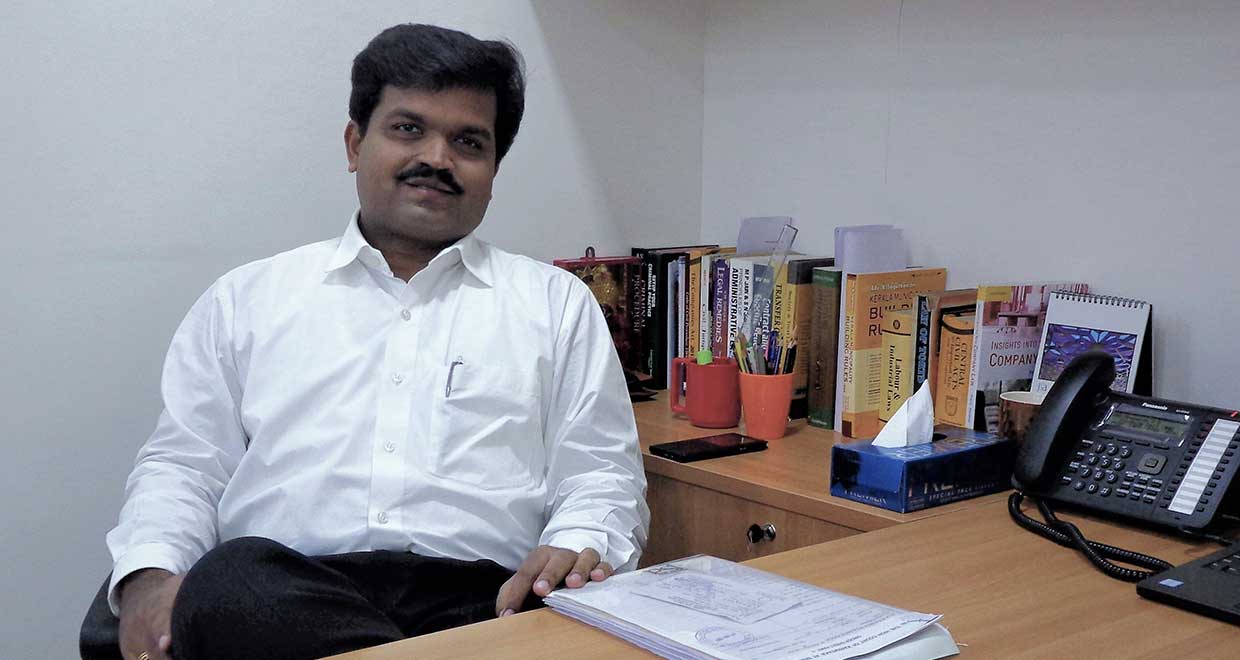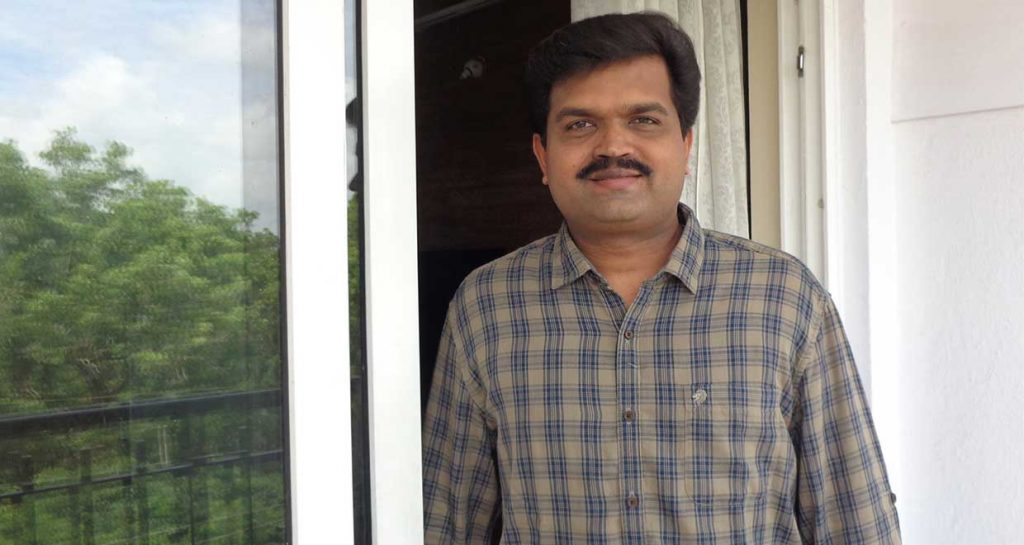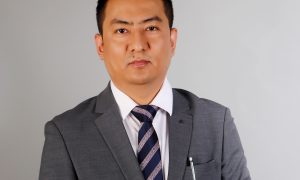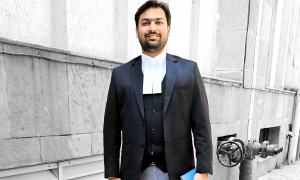Prasanth V.G. graduated from WBNUJS, Kolkata in 2005 and thereafter joined Delhi office of Paras Kuhad and Associates. He is currently a Partner at J. Sagar Associates, Bangalore. He primarily specialises in dispute resolution and has an experience for twelve years. He has been handling matters relating to Company Contracts, Specific Relief, Intellectual Property, Banking, Infrastructure, Energy, Consumer Protection, Infrastructure and Arbitration. He has a vast experience in the drafting of pleadings, applications and evidence briefing for several counsels in numerous matters, and has also done many arguments including both final and interim arguments at various fora.
. In this interview he talks to us about:
- His law school life at WBNJUS, Kolkata
- His experience of a litigation lawyer at a firm
- The essentials of a good commercial litigation lawyer
Given that most of our readers are law students and young lawyers, how will you introduce yourself to them?
I will not shamelessly claim that I am a “Super Lawyer”, but I am certainly one who constantly dreams of being a “Super Lawyer” whom society looks up to. I am a Partner at the Bangalore office of J. Sagar Associates and my area of work is dispute resolution. I graduated from the first batch of NUJS, Kolkata in 2005 and started my career at the Delhi office of Paras Kuhad and Associates in 2005. In 2010 I shifted to Bangalore and worked for a short period of ten months at KLaw. In April 2011 I joined JSA Bangalore and I have been here since then. My father’s father and my mother’s great grandfather were lawyers, but both of them had passed away much before I was born and therefore I cannot say that I am from a family of lawyers.
How was your experience at NUJS?
To be frank, I had never before come across in my life an ambiance as fiercely competitive as was present at NUJS. The first batch of NUJS was a unique pack of some of the most gifted brains and talents. The levels of competition we had were naturally very intense. The fact that we were guided by a personality as towering as Dr. Madhava Menon, who had the unique ability to inspire his students to always dream high and strive, was the most remarkable feature of our NUJS life. He would constantly motivate all of us to very deeply believe that anything less than excellence is self-derogatory. I feel truly blessed to have studied law as a part of the first batch of NUJS, which had tremendous levels of ambition and zeal and was constantly very high on energy and drive.
However, one tough question that my senior partner recently asked me was whether in the last twelve years anyone from our batch has really become a legend for his or her age. I found it very difficult to answer. Everyone is working at decent designations to keep their pride happy and earning decently to keep their families happy, but whether that is all the NUJS dream was, is a soul-searching question. Hopefully, I will have a clearer and happier answer after the next twelve to fifteen years. One may take until the age of 35 to settle down, but if he does not have the big break between 35 years and 50 years, one may rather reconcile that it was all for the making of just another office-goer. The hair has already started the tendency of greying here and there.
What were your areas of interest in law school?
Amongst the various academic subjects, I had maximum interest in Constitutional and administrative laws. I also deeply enjoyed the laws of contract, specific relief, property, statutory interpretation, etc. Preparations for and participation in both internal and external moot courts was considered to be a very important exercise by our whole batch. I also had my share of regular mooting experiences in those five years, including representing India at the Stetson moot court at Florida. Exploring and re-exploring the city of Calcutta on every Wednesday, which used to be the weekly holiday, was one of the most joyous part of our life. NUJS life was the first phase in my life which introduced me to a truly national ambiance. It was a remarkable experience getting to know and making friends with the peer coming from various different cultures and sensibilities across the country. All these were matters of great excitement at the impressionable age.
Can you recall a few interesting instances in your litigation career?
I will first answer the question on preparation. More important than how I routinely prepare, is how I think one ought to prepare. I am therefore making a general analysis and not any self-proclamation. One message I learnt from the great masters I had the occasion to meet or work with, is that every court appearance, however small or big, must be treated as a break by a litigation lawyer. It always helps to prepare for a matter beyond your brief for any given day’s appearance. Trying to put a lot more effort into every matter than what may be immediately required to attend to it, will over a period of time, make you very resourceful.
While in my initial days at PKA Delhi, I was given a lot of exposure in DRT and DRAT matters. One set of matters that Mr. Kuhad made me in charge of was a series of cases filed by various banks and financial institutions against a pharmaceutical company, which was our client. I still remember the strenuous manner in which I went about labouring to put together the written statements and various interim applications on behalf of the company, trying to bring out some defence or the other in each matter, which otherwise appeared to be very open and shut against our client. It was a lot of learning on the job which gave the conviction that no matter can be given up as defenseless, if you are willing to go into the depths of documents and do some creative work at linking or de-linking ideas and points.
Another Delhi matter which stands out in memory is an international arbitration which went on for about five years, in which we were representing an American company. What makes it memorable is the long days and nights spent reading through, deciphering and connecting thousands of pages of disorderly papers which used to come in heavy cartons from Dallas. There were several note books full of hand-written notes which I made while trying to organize the defences in the matter, trying to frame questions for cross examination, etc. We eventually lost the matter, but it was a rewarding experience for one’s faculties to go through the grill it demanded at a very early stage of career.
Another interesting memory is that of a partition suit before the Delhi High Court. We were representing the Plaintiffs. We briefed Mr. Arun Jaitley for the first hearing and he got us an ex-parte order of appointment of a local commissioner to inspect and make an inventory of extremely valuable family heirloom items including gold, silver, diamonds, ruby, paintings, carpets etc., which according to our side, had been hidden by the Defendants inside the family house in Kolkata. I flew along with the local commissioner to Kolkata with the order and we went to the concerned premises the next morning along with the local police. The events which took place at the premises were nothing less than dramatic. After a lot of initial resistance and thereafter reluctant cooperation, the Defendants insisted that there was no express order to forcefully open the locked safes and almirahs. So I flew back to Delhi that evening while the local commissioner stayed over in Kolkata. The next morning we again mentioned and brought up the matter before the Delhi High Court and got a specific order to open all the safes and almirahs. With that order, I again flew back to Kolkata that night and we again went to the premises the next morning to get it enforced. While I do not want to go into the details, since both parties thereafter amicably settled the matter, it was a unique on-the-floor experience which stands out in memory even now.
A more recent interesting episode was arguing on behalf of a sugar manufacturing company against local sugarcane farmers of a village before the Deputy Commissioner, Bellary. The farmers were refusing to provide sugarcane to the factory due to the alleged arrears in the payments of the previous sugar seasons. I had to argue that under the law all the farmers falling within the reserved area necessarily had to supply the cane to my client, irrespective of any past dues, for which they had already invoked the recovery mechanism. The farmers were led by the local MLA and were also represented by their lawyer. Our side had already made a statement against the intentions of the local MLA before the Karnataka High Court in a related matter and that had got reported in the newspapers before my visit to the village to argue the matter. When I reached there with the company representatives, I was amazed to see that a huge community hall was reserved for the hearing and about 300 farmers had gathered and the atmosphere was volatile. The local MLA met us as we were entering the building and started shouting at the company representatives. There were only a few policemen and they could not have handled the situation if the mass had taken the law into hands. The arguments were like making public speeches since that had to be made from the stage before the full crowd using the microphones. I was reminded of my school and college debating and mooting days. When I started arguing in English, the crowd started shouting that I should argue only in Kannada. The Deputy Commissioner who was a very dynamic young IAS officer suddenly took complete charge of the situation and demanded that the crowd shall not protest since I was not very fluent in Kannada. There were detailed arguments and counter-arguments between me and the farmers’ lawyer and the crowd patiently heard everything. The MLA also respected the fact that legal arguments under the Sugarcane Control Order and Essential Commodities Act were going on and remained silent watching the whole proceedings from the front row. Once the hearing was over, the crowd started getting agitated again, demanding that the order should be pronounced immediately. Many people came forward and started to stage a gherao, when the policemen came forward to make way for the Deputy Commissioner. In the process, we also made our way out and left for the hotel.
There are many other interesting episodes I can narrate, but I am stopping here as this answer has already become very lengthy.
How did you face the work pressure?
In a way, everything in the profession of law, and not merely being in law firms, can be demanding. But I will always say with the fullest pride and conviction that JSA is a bliss.
There are two very helpful ways to handle pressures in this profession:
Firstly, you should try to know in detail each matter you handle. Unwilling or unenthusiastic participation without trying to be on the top of everything in a matter can make the situation very painful. Please also understand that you cannot mentally dislike or fight anything and then conquer it. You can conquer something only by most genuinely loving it. Comfort and ease are directly proportionate to your familiarity with the matter at hand. Your familiarity with the matter is directly proportionate to the time, attention and nurturing you give to it. Therefore much of it has got to do with the mind-set. If your mind genuinely aspires for heavier responsibilities, it will work wonders. If you decided to join law and you have progressed to a stage where there is no going back to engineering or medicine or anything else, then you might as well love your work on the subject than keep focusing on the exhaustion it causes.
Secondly, avoid as much as possible, the intake of people-related negativity. It only takes away time and energy unnecessarily. Stop judging others. Stop telling yourself how imperfect or unjust others are. Stop also fearing that someone else will take away what you think is due to you. Do not let your mind dwarf you. Do not be a constant complaint-box indulging in shadow-boxing. The world has been, is and will remain unfair in varying degrees. There is no perfect world that has ever existed. While we all should work towards an ideal world, we should also remain realistic. After all, when you decided to join law, did you not know that you will interact with all sorts of people in life? Do you think a Jethmalani or a Nariman or a Venugopal or a Salve was made because they dealt all along with only the nicest of human beings? I am certain they would have dealt immensely with rogues, scoundrels and crooks in their fabulous journey as lawyers. So remain a good human being to everyone, without losing energy over the fact that an ideal world does not necessarily exist around us. A change in the mind-set can instantly take away your pains and bring a smile.
A litigation lawyer in a corporate law firm is in the minority. What are your experiences holding this unique position?
That is a very interesting question. I have to tell you three things in response:
Firstly, in the litigation circles in general, you will find a lot of people who are cynical about non-litigation work and are unable to appreciate or respect the practice of corporate or transactional laws as real lawyering. I feel sad for those who sustain the said mentality. Let me tell you in no uncertain terms that law is not all about disputes. Law as a profession was derived from the requirements and needs of the society. If today’s society or economy mandates that a lawyer has a distinct space in a bank or an insurance company, who are we to deny it and claim that a lawyer is only for the court rooms? Therefore do not live in a self-created illusory world of bald denials.
Secondly, we also need to burst this false and unfounded myth that most of our premier law schools are not serving the society since they are primarily catering to the needs of the corporate world. How many law graduates are created every year in this country and what percentage of them can all the corporate law firms and companies together recruit? Will Amarchand, JSA, AZB, Trilegal and all the other top law firms together be able to recruit even 1000 fresh lawyers in a year? If I am not mistaken we are creating not less than 50,000 new lawyers every year. If you wish to write off the largest majority of new lawyers who add to the already over-crowded court rooms and wish to find fault with the micro-minority who get corporate placements, the problem is really your inability to see the plain and simple reality. Further, I am also willing to concede that my friends on the corporate side helping the business of a company to be set up or helping a company with its project finance is doing as much, if not more, service to the society as is done by me or others in the court rooms.
Thirdly, to specifically answer your question, I believe there is a very unique space for a litigation lawyer in a firm which primarily handles non-litigation works. A litigation lawyer is essentially a story-teller. He always has a narration to make. His clients come with narratives. His files are full of narrations. He reads his case laws to extract a dictum emerging out of divergent contentions placed in the background of a factual narration. He reads his statutes looking for “the scheme of the law” and in the said process goes back into the social context or philosophy of law also goes forward into the social consequence of the written words of law. He is constantly preparing to articulate a narration in writing in his court pleadings. He is constantly selling stories to the judges. There is therefore an inner voice that starts communicating with you as a litigation lawyer, which I think can be synergised well even with non-litigation work. I truly believe that this mental process can tremendously help you creatively contribute to the work your colleagues are doing even in the non-litigation spheres. You can, not only deal with a contract when it runs into a dispute but can also assist your colleagues with appreciating a contract in a certain narrative form, concept and structure from its formative stages itself. You can assist your friends with providing legal opinions from various interpretative possibilities. According to me, a new work culture has to emerge which appreciates that a litigation and a non-litigation lawyer have a lot to work to do in tandem at every stage of a deal. Instead of seeing practise areas in isolation, synergies should be developed and maintained at stages when a contract is being drawn up, when a certain structure is being designed and when clauses are added in developing the said structure.
What are the most important characteristic one needs to develop to succeed in the field of law?
Everything which works for one person, need not necessarily work for another. One needs to find his or her own answers and approaches through a constant process of enquiries, observations and self-analysis. There can however be a few very general guidelines, which possibly work commonly for the vast majority. In that general sense, I can always say a few things like one must constantly work on his language skills, on his physical and mental energy levels to sit for long hours of work, on his ability to carry the people around you together, on his approachability and availability to those who you service etc.
But what according to me should form the most important characteristic or hallmark is the ability to proportionately mix the right amount of humility with the right amount of confidence, without either of it coming at the expense of the other.
Humility is a must, or else you will never be a constant learner. You may be a first rank holder in 10th or 12th, but do not come to law with the same approach with which you thought of academics earlier. There would have been a certain amount of comprehensiveness or finality to anything you dealt with in your school before joining law. That is just not the case with law. Do not think that law is all about the syllabus you have in each subject in your class. For example, you may have just one semester to complete the Evidence Act, but let us bow down to the fact that it takes a life time to know the Evidence Act well. You may have just two semesters to deal with the whole of Company law, but it is again a lifetime affair to know it well. So, the legal education in law schools is only an introduction to the larger world. All along the law school as well as while in the profession, there is a constant requirement to bow down before the enormity of the subject and also the eminence of the great masters around.
However, this humility shall not come at the expense of your confidence. The study and practise of law is also about the ability to take one’s own positions. I can tell you about my batch from NUJS. Throughout NUJS our batch debated human rights, child rights, farmers’ rights, tribal rights, women’s rights, prisoner’s rights and the like. However, our batch turned out to be one of largest contributors to corporate law practise. How does something like this happen? This happens because essentially you are developing a talent. You are developing the confidence of a person to go into details of any subject and take one’s own stand. Many times, Dr. Menon would engage the class in discussions based on some newspaper article instead of statutory provisions, and would yet create a confident lawyer out of you at the end of the session. Therefore please remember that while you respectfully carry the much-needed facet of humility, you must also confidently be able to believe that even if the best counsel in the country appears against you in a matter, you will do a good job and will not run away. If he can do it, so can you. Can’t you? Think about it.

























